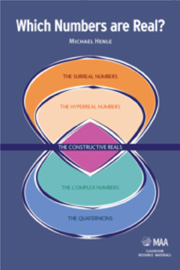7 - The Surreals
from III - ALTERNATIVE LINES
Summary
Introduction
The surreals, like the hyperreals, are a relatively recent invention, discovered in the early 1970s by John H. Conway. Like the hyperreals, the surreals contain infinitesimally small numbers and infinitely large numbers. Unlike the hyperreals, the surreals are not a structure for the reals. Thus it is not true that every function and relation on the reals has an extension to or a meaning for the surreals.
A spirit of playfulness animates the surreals. They might be called hippie numbers after the “flower” children, who dropped out of society and lived communally in the Vietnam War period when the surreals were discovered.
A distinctive feature of the surreals is that they are part of the theory of combinatorial games. Within the world of combinatorial games, surreal numbers constitute a reference set of games used to evaluate positions in other games. The connection between the surreals and games leads to a proof technique unique to the surreals: prove a theorem by playing a game. Surreal proofs are constructive in spirit, although dependent on a strong form of induction.
Another feature of the surreals is that while constructing them, all other numbers are constructed too. The number systems we've considered so far have taken the rationals for granted. The surreals start with nothing. Not even the integers are needed.
Combinatorial Games
Combinatorial games are games between two opponents, traditionally called Left and Right, who take turns changing the position of the game. Some of these games are played on a board with physical pieces of some sort; others are purely mental.
- Type
- Chapter
- Information
- Which Numbers are Real? , pp. 171 - 204Publisher: Mathematical Association of AmericaPrint publication year: 2012



